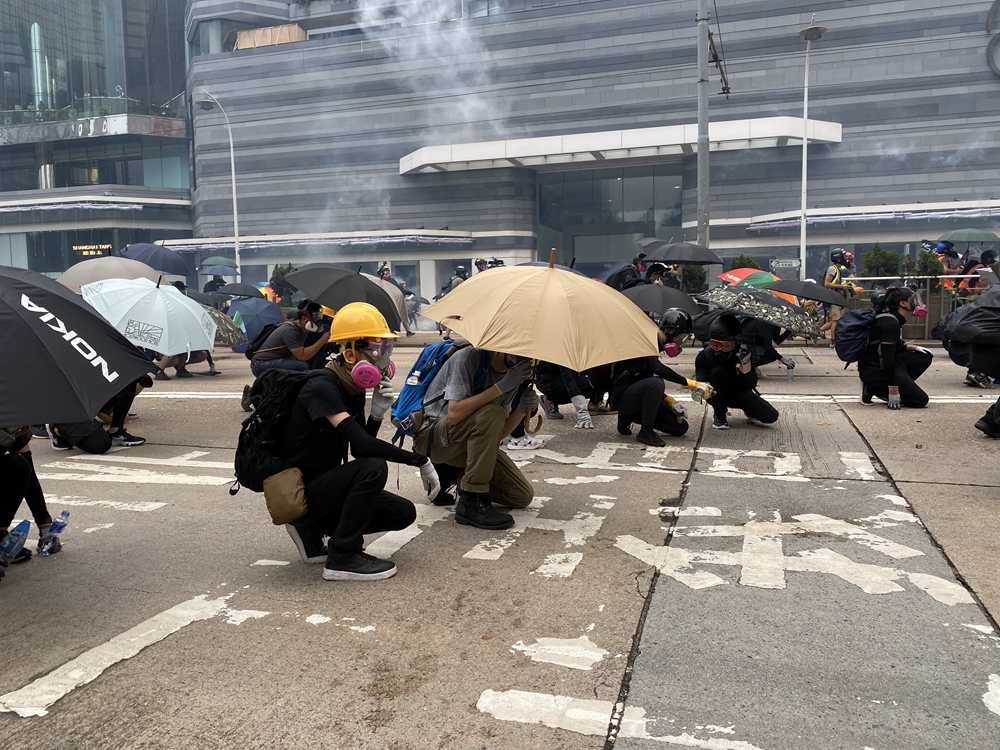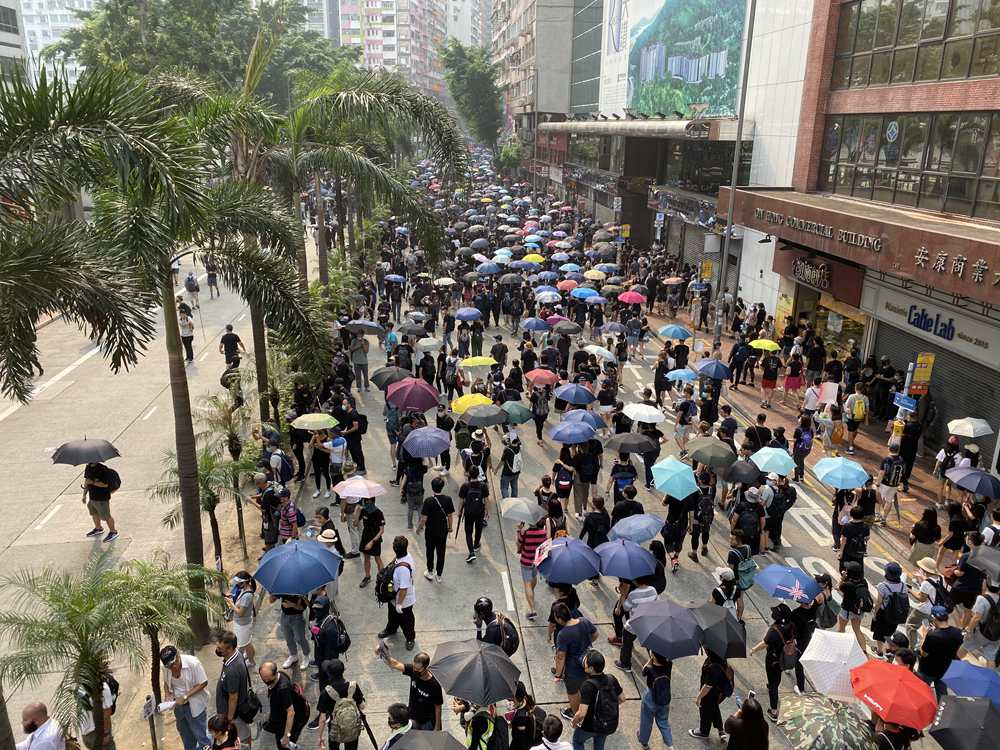02:44

A march on Sunday afternoon on the Hong Kong Island turned ugly even before it started. Water bottles and trash picked from the ground by protestors - some hard-surfaced - were flying all over the street in front of SOGO, a major shopping mall in Causeway Bay.
Police quickly pulled out their black flag, warning of tear gas deployment if crowds refused to calm down. After a few bangs, people started to cough and cry and disappeared in white smoke from dozens of rounds of tear gas, and that was only two in the afternoon.
My colleagues and I had to find shelter - watering eyes and burning throats - our drug store goggles and masks were just not adequate for such a situation.

Protesters use umbrellas to cover their moves and shield themselves during violent demonstrations in Hong Kong. /CGTN Photo
Protesters use umbrellas to cover their moves and shield themselves during violent demonstrations in Hong Kong. /CGTN Photo
Some of the protesters, though, have masks able to fully cover their faces.
Protesters took a step back - quiet down a bit, and re-organized to proceed with their march to that day final destination: the Hong Kong government headquarters.
Have they reached adult age?
The march reached its destination of the Admiralty, home to many SAR government offices.
On Queensway Road, a major passage to the government headquarters, serious confrontations took place between the protesters and police.
The protesters threw petrol bombs, followed by rounds of tear gas from the police.
I've been in the "frontline" of the Hong Kong protests multiple times, but this was the first time so many rounds of tear gas were fired as the police seemed determined to stop the radicals' violence from escalating.
Amidst the chaos, I saw one thin male protester attending a female one choking by the tear gas.
Completely black clad, and armed with umbrellas, and heavy-duty gas masks, youngsters like him were usually found to be the ones at the front line.
A quick talk was enough to know that talking through the masks was impossible, so I took off mine, but he didn't want to do the same.
"How old are you?" I asked. That's when this very interesting moment happened. He looked away and started to giggle - and after two seconds, he responded, "18 years old." To be honest, I doubt the answer judging from his small body frame.
I also ran into two "suppliers" dressed not as intimidating, holding bottled water and chanting slogans, looking like to be in their late teens. They said that they were also scared as protests turned to a battle-field but they were still not satisfied with the government.
"What makes you happy?" I asked. They looked at each other in a moment of silence.
"At least they will set up an independent …" the boy responded but soon lost his words and turned to the girl for help.
"An independent investigation for the police," the girl helped out.
On that note, Hong Kong Chief Executive Carrie Lam has said multiple times that she is still confident in the already established the Independent Police Complaints Council (IPCC), for the investigation into alleged police brutality, and urged people to at least give the IPCC a chance to do its job before asking for a brand new organization.
Younger people account for a huge amount of the street protesters and radicals at the front throwing petrol bombs at police lines. Many are found to be only 16 or 17 years old.
According the Hong Kong police, about one-third of the 1,600 people detained during the protests are students.

Thousands of protesters carrying umbrellas march from Hong Kong's Causeway Bay to the HKSAR government headquarters. /CGTN Photo
Thousands of protesters carrying umbrellas march from Hong Kong's Causeway Bay to the HKSAR government headquarters. /CGTN Photo
Meet Cyrus
My team spent the entire afternoon following the march, climbing up and down. We were exhausted before sundown. I took along my female editor who was partly in shock.
It was an unsettling scene, yet, it could turn uglier after sundown. While the night was still young, protestors took a detour back to Causeway Bay, where Sunday march started. Along the way, more petrol bombs, more fire, and road signs and bus stops were taken down to build road blocks. We were trailing the protestors until running into Cyrus, a 22-year-old Hong Kong local.
On a ramp way above Queensway road, a relatively safer spot for media to have good shots of both the police and protestors. One young man caught my eye. He wore no reflective vest for the press or any protective gear at all. And he was not even wearing any thing black, a color sympathizing the protest. He is Cyrus.
He told me that he does not fully support either side but leans towards those young on the street. Cyrus did not want to show his face on the camera because he came to observe the protest without his parents knowing. His parents, though, are Blue Ribbons: pro-police, pro-government camp.
Those weekend protests somewhat have turned to a scouting event for me - the easiest time for me to speak with people. During weekdays, when Hong Kong streets return normal, it is near impossible to find regular people on streets, who are willing to talk about the protests. Cyrus was very frank and outspoken.
"No matter what the government and the police have done to solve social problems, I think many people will not trust them," said Cyrus.
And he thought how people get their information and where they get it is fueling this distrust.
"My opinion is that right now, what we are seeing, we have to ask ourselves do you have the evidence to support it. If you do not have the evidence, you just hear from your friends or from the internet. Are they really trusty-worthy? This is the question I am still thinking about," he noted.
To answer this question, Cyrus came to watch Sunday's protest, the first time so intimately. While he did not want to say it right out loud that the police was not violent, he said both sides - the police and the protestors - have turned to violent means. Cyrus also shared a similar concern of mine, over those younger people, many are proven to be minors.
"I really worry about this group of people because do they really know about the protest, like the background and the purpose. And how about the information? I am just afraid of whether they are thinking critically," he said.
Another good point Cyrus made was that both the protestors and the police are all just people of Hong Kong, and it just does not seem anything would come out of people hurting people.
(Justin Chan filmed the story, and Wei Diqi contributed as a Cantonese interpreter and field producer.)